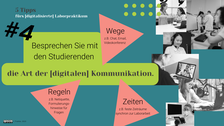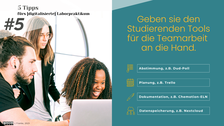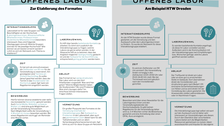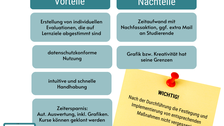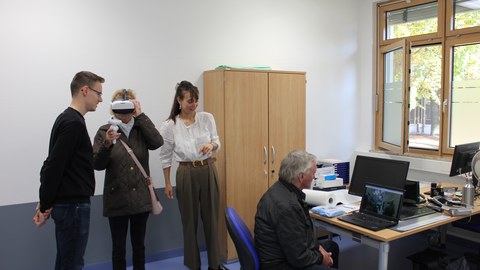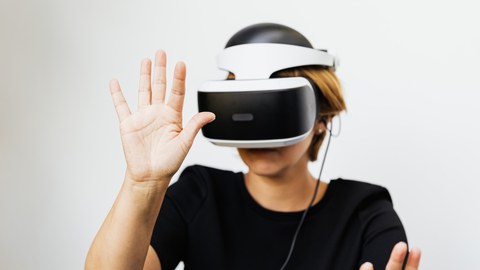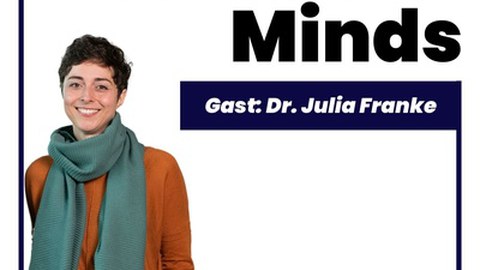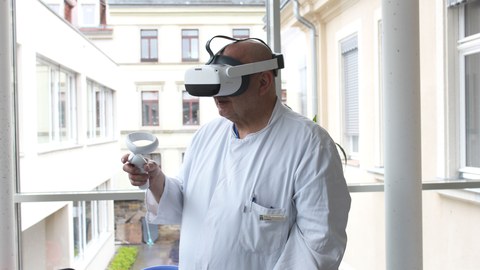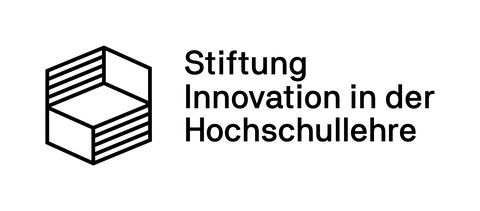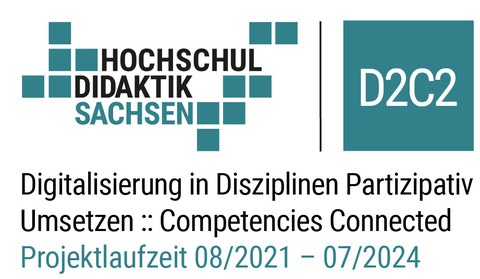Open Lab
In addition to three other focus areas, the Saxon-wide joint project D2C2 shines a light on (partial) digitalization in teaching in workshops and labs. Each workshop and lab is unique, making the challenges and opportunities that instructors face very subject-specific. Under the umbrella of OPEN LAB, we provide lab instructors and (assistant) teaching staff with a program tailored to their needs.
On this page, you can find information on the following:
Table of contents
Events
Short and to the point: We keep our events to short, one to two-hour sessions to ensure that you can attend despite your fullly packed work schedule. We’re also available to answer any individual questions you may have at .
XR-Community
As a third learning venue, XR-environments can be used to establish a link between theory and practice, even before students attend their first lab or workshop sessions. XR-scenarios may thus be used to foster students' skills in different professional and research environments without having to bear the consequences of possible safety or economic risks.
In order to pool resources and make existing expertise in the field of extended reality (XR) visible, we initiated an XR-community in spring 2023. Since then, interested instructors and researchers have been meeting every other month in Dresden as part of the community to present projects, learn about the latest developments in the field of extended reality and discuss possible collaborations.
Next Meeting: September 25, 2:30-4:00 pm / venue: Open Science Lab1, SLUB (Zellescher Weg 25, 01217 Dresden) and Online (see OPAL)
Language: The event is held in German. However, please feel very welcome to ask questions or make remarks in English.
Would you like to find out more about the community and attend an upcoming meeting? You will receive regular invitations and updates on the latest activities via a non-binding registration in the community's OPAL course.
Lab Lunch Lectures (online)
| The last lab lunch break took place in July 2025. We would like to thank you for the wonderfully diverse exchange of your experiences and ideas that took place over the past three years. In total, we were happy to welcome over 600 participants to our lab lunch lectures. We wish all lab instructors and students continued enjoyment in learning and teaching — may curiosity always outweigh the challenges along the way! |
Open Labratory
Every laboratory is unique. Consequently, there is no "one fits all"- solution to how to best teach in labs. During our open labratory tours, you will gain insight into various labs at Saxonian universities. Discover different lab facilities and get to know the faculty and other staff members on sight.
Next date: tba
Engineering Network: Open Exchange on ELN
Electronic Laboratory Notebooks (ELN) are becoming increasingly important in engineering research and teaching - for structured documentation, better traceability, collaboration and the sustainable management of research data.
Next event: tba
Tips and materials
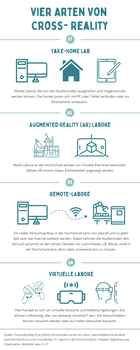
© D2C2/Geishecker
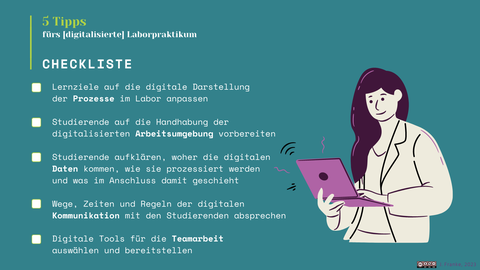
© D2C2/Franke
![Fünf Tipps fürs [digitalisierte] Laborpraktikum Nummer 1: Bereiten Sie die Studierenden auf die Handhabung der [digitalisierten] Arbeitsumgebung vor.I.DEFINIEREN Sie was die Studierenden handhaben müssen II.KOMMUNIZIEREN Sie was verlangt wird, z.B. Experimente im Remote Labor initiieren, Instrumente richtig ablesen III.DEMONSTRIEREN Sie die Handhabungsschritte, die beherrscht werden müssen, mindestens zwei Mal. IV.ÜBERPRÜFEN Sie, ob die Studierenden die Handhabung beherrschen.](https://tu-dresden.de/zill/ressourcen/bilder/copy_of_d2c2/tipps-materialien/Kopie-von-5-Tipps-fuers-digitalisierte-Laborpraktikum-1.png/@@images/7afb8b3b-efab-4cea-ae41-54cc6899e507.png)
© D2C2/Franke
![Fünf Tipps fürs [digitalisierte] Laborpraktikum. Nummer 2: Passen Sie Ihre Lernziele auf die digitale Darstellung der Prozesse im Labor an. Frage 1: Welche Prozesse werden rein digital abgebildet (z.B. chemische Reaktion oder ein Arbeitsablauf)? Frage 2: Inwieweit geht die Sinneserfahrung oder physische Handhabung verloren? Frage 3: Welche Hilfen (z.B. optische Signale oder Markierungen) müssen eingebracht werden, um den Prozess verständlich darzustellen? Frage 4: Welche Lernerfahrungen gehen verloren und welche neuen kommen dazu?](https://tu-dresden.de/zill/ressourcen/bilder/copy_of_d2c2/tipps-materialien/Kopie-von-5-Tipps-fuers-digitalisierte-Laborpraktikum-2.png/@@images/46bebc3e-cf1e-4cb0-b535-061ebeec1635.png)
© D2C2/Franke
![Fünf Tipps fürs [digitalisierte] Laborpraktikum. Heute Nummer 3: Vermitteln Sie, was mit den [digitalen] Daten geschieht. A) Externe Daten: Wie wurden diese erhoben, prozessiert und eingespeist? B) Interne Daten: Wie werden diese digital protokolliert und prozessiert? C) Daten, die das Labor verlassen: Was passiert, wenn Daten geteilt beziehungsweise publiziert oder weiterverwendet werden?](https://tu-dresden.de/zill/ressourcen/bilder/copy_of_d2c2/tipps-materialien/Kopie-von-5-Tipps-fuers-digitalisierte-Laborpraktikum-3.png/@@images/28498e00-5bf9-4ef9-bfc4-39f005aa42a8.png)
© D2C2/Franke
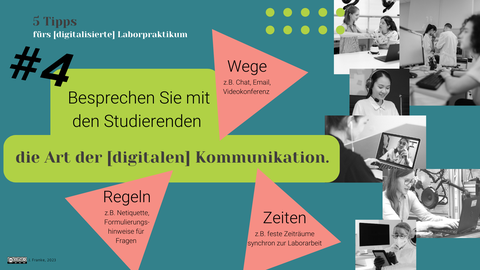
© D2C2/Franke
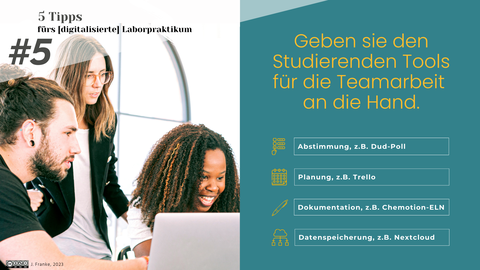
© D2C2/Franke
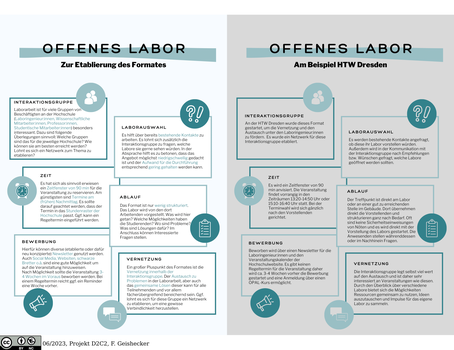
© Freya Geishecker / D2C2
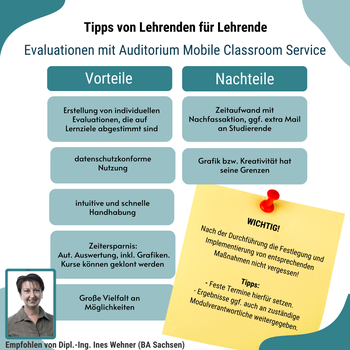
© D2C2/Wegner
Downloads (in German):
- 4 Types of Cross Reality as according to Terkowsky et al., 2021
- Checklist: 5 Tips for (Digital) Lab Training
- 5 Tips for (Digital) Lab Training
Previous Events
Project Funding
All OPEN LAB materials and events are created by the joint project D2C2, funded by the Stiftung für Innovation in der Hochschulehre.
You can find more information about D2C2 in German on the Saxon-wide alliance website.
You can find out more about D2C2 at TU Dresden at tu-dresden.de/zill/das-zentrum/projekte/d2c2-1.

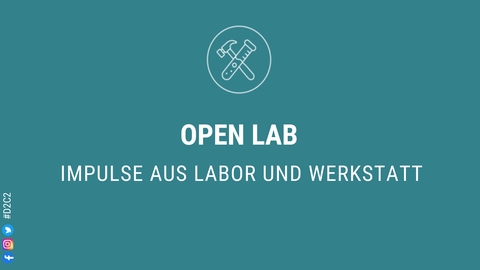
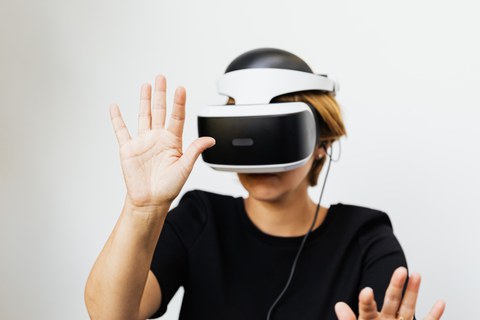
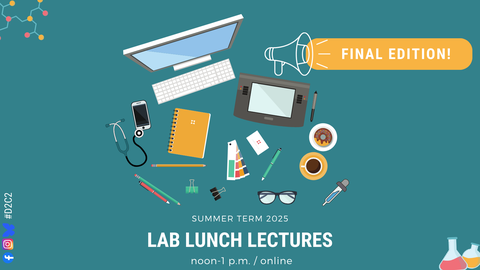
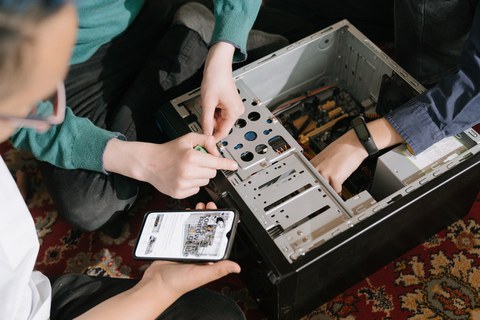
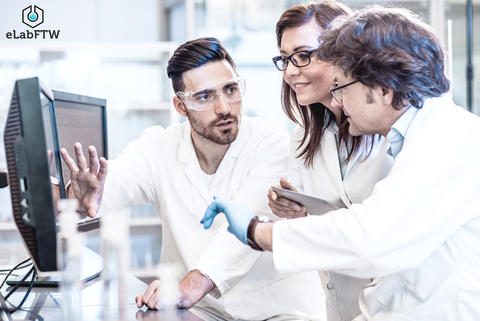
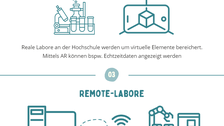
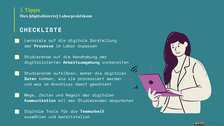
![Fünf Tipps fürs [digitalisierte] Laborpraktikum Nummer 1: Bereiten Sie die Studierenden auf die Handhabung der [digitalisierten] Arbeitsumgebung vor.I.DEFINIEREN Sie was die Studierenden handhaben müssen II.KOMMUNIZIEREN Sie was verlangt wird, z.B. Experimente im Remote Labor initiieren, Instrumente richtig ablesen III.DEMONSTRIEREN Sie die Handhabungsschritte, die beherrscht werden müssen, mindestens zwei Mal. IV.ÜBERPRÜFEN Sie, ob die Studierenden die Handhabung beherrschen.](https://tu-dresden.de/zill/ressourcen/bilder/copy_of_d2c2/tipps-materialien/Kopie-von-5-Tipps-fuers-digitalisierte-Laborpraktikum-1.png/@@images/5e592b8d-ecba-4583-91fd-5ff650b32c0e.png)
![Fünf Tipps fürs [digitalisierte] Laborpraktikum. Nummer 2: Passen Sie Ihre Lernziele auf die digitale Darstellung der Prozesse im Labor an. Frage 1: Welche Prozesse werden rein digital abgebildet (z.B. chemische Reaktion oder ein Arbeitsablauf)? Frage 2: Inwieweit geht die Sinneserfahrung oder physische Handhabung verloren? Frage 3: Welche Hilfen (z.B. optische Signale oder Markierungen) müssen eingebracht werden, um den Prozess verständlich darzustellen? Frage 4: Welche Lernerfahrungen gehen verloren und welche neuen kommen dazu?](https://tu-dresden.de/zill/ressourcen/bilder/copy_of_d2c2/tipps-materialien/Kopie-von-5-Tipps-fuers-digitalisierte-Laborpraktikum-2.png/@@images/4fccb253-c4e7-4780-9703-7cb970284650.png)
![Fünf Tipps fürs [digitalisierte] Laborpraktikum. Heute Nummer 3: Vermitteln Sie, was mit den [digitalen] Daten geschieht. A) Externe Daten: Wie wurden diese erhoben, prozessiert und eingespeist? B) Interne Daten: Wie werden diese digital protokolliert und prozessiert? C) Daten, die das Labor verlassen: Was passiert, wenn Daten geteilt beziehungsweise publiziert oder weiterverwendet werden?](https://tu-dresden.de/zill/ressourcen/bilder/copy_of_d2c2/tipps-materialien/Kopie-von-5-Tipps-fuers-digitalisierte-Laborpraktikum-3.png/@@images/6088d082-82aa-4394-9831-100379ca5206.png)
